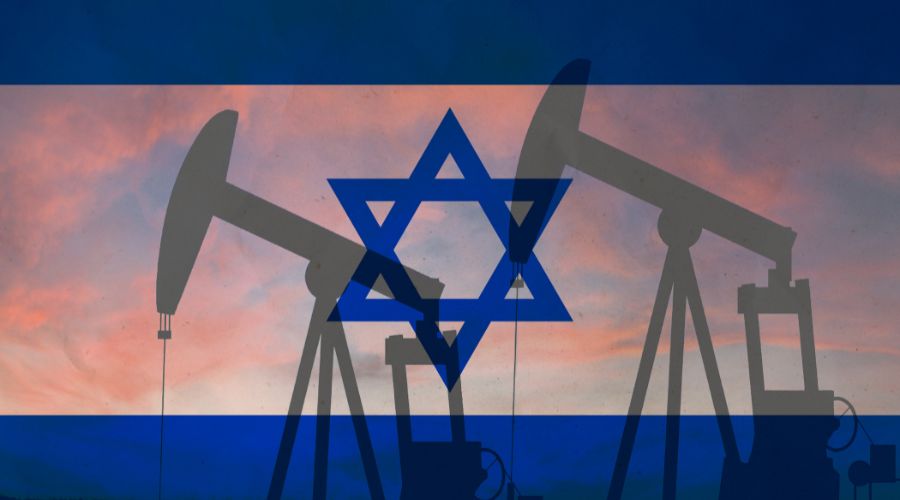Israel is both an importer and exporter of oil. In 2021, Israel imported $1.36 billion worth of oil and exported $252 million. Bulgaria and India were the largest buyers of Israeli oil. As of 2023, Israel’s average daily crude oil requirement stands at 220,000 barrels [1]. Countries in the Islamic world play a significant role in meeting Israel’s oil needs, supplying 60% of its required oil. This article will explore the various components of Israel’s oil supply.
Oil Pipelines Supplying Israel
Most of Israel’s oil is supplied through three key pipelines, which will be discussed below.
Baku-Tbilisi-Ceyhan Pipeline [2]
This pipeline starts in Azerbaijan, runs through Georgia, and reaches the port of Ceyhan on Turkey’s southern coast. The pipeline transports oil from Azerbaijan and Kazakhstan. Approximately 40% of Israel’s oil needs are met through this pipeline [3], and overall, Azerbaijan and Kazakhstan together supply 60% of Israel’s oil. British Petroleum (BP) is responsible for the construction, operation, and maintenance of this pipeline [4]. After the war in Ukraine, the instability of the Black Sea made this route a safer option for Kazakhstan’s oil exports. The pipeline’s capacity is estimated to be around 1.2 million barrels per day [5].

Tengiz-Novorossiysk Pipeline [6]
The Tengiz-Novorossiysk pipeline, initially built during the Soviet era for Kazakhstan’s oil exports, remains Kazakhstan’s main export route. It begins at the Tengiz oil field in Kazakhstan and passes through Russia to reach the Novorossiysk port on the Black Sea. Although the pipeline is aging, recent upgrades have increased its capacity, reaching around 1.4 million barrels per day by 2022 [7].

Baku-Supsa Pipeline [8]
The Baku-Supsa pipeline originates from the Sangachal terminal in Azerbaijan and reaches the port of Supsa on Georgia’s western coast on the Black Sea. Notably, this pipeline is also operated by BP [9]. It was constructed during the Soviet era but was renovated in 1999, and it currently has a capacity of 145,000 barrels per day [10].

These three pipelines collectively carry about 60% of Israel’s oil. However, they also supply oil to many other European countries.

Companies Supplying Oil to Israel
Several companies play a role in supplying oil to Israel. Below are brief descriptions of some of them.
British Petroleum (BP) [11]
A UK-based company active in Azerbaijan, BP manages oil extraction and pipeline operations there. It also operates in Egypt, primarily in the natural gas sector. BP’s activities in Azerbaijan are extensive, including work on oil platforms such as the Chirag, Central Azeri, West Azeri, East Azeri, Shah Deniz Alpha, Shah Deniz Bravo, Deepwater Gunashli, Western Chirag platforms and central eastern Azair [12].
Chevron [13]
This American company operates primarily in Kazakhstan, where it holds over 50% of the Tengiz oil field [14]. This field is crucial as it is the source of the oil pipeline exporting Kazakhstan’s oil to Israel. Chevron is also involved in offshore oil exploration in Israeli waters [15], reflecting its close ties with Israel while operating in one of Kazakhstan’s largest oil fields.
Vegas Oil [16]
This Greek-American company has been active in Egypt since the 1990s. Although Egypt’s oil production is relatively modest, after the cessation of oil exports from Iraqi Kurdistan to Israel, Egyptian oil became one of the alternatives Israel considered. However, Egypt’s oil industry is largely controlled by the Egyptian General Petroleum Corporation (EGPC), and companies like Vegas Oil, Dana Petroleum [17], BP, Shell [18], ExxonMobil [19], and Total [20] operate in partnership with EGPC [21].
Israel Corporation [22]
Known as “Corp”, this holding company is involved in oil and gas, petrochemicals, shipping, and shipbuilding, with many subsidiaries [23]. The company is owned by the Ofer brothers, and its subsidiary, Bazan [24], operates Israel’s refineries [25].
Shipping Companies Supplying Oil to Israel
As mentioned earlier, a portion of Israel’s oil is transported by sea. Several shipping companies are involved in this process, briefly introduced below.
ZIM [26]
A subsidiary of Israel Corporation, ZIM is a shipping company that operates a modern fleet, including oil tankers. ZIM is one of the largest privately-owned shipping companies globally [27].
Other Companies
Other shipping companies that provide tankers for Israel’s oil supply include United Sky Shipping, based in Singapore [28], Denmark’s Norden Hellerup [29], and Cyprus’s Petronav Ship Management[30].
#Israel’s_Oil_Supply_Chain
#Muslim_Countries
Footnotes:
[1] Where Does Israel Get Its Oil? – October 26, 2023
[3] Turkey Fails to Respond to Iran Call for Ban on Shipping Oil to Israel.
[5] BP’s Report on the Baku-Tbilisi-Ceyhan Pipeline
[7] Kazakhstan: A Questionable Source of Oil for European Refineries
[10] The Three Pipelines That Transport Azerbaijan’s Oil
[12] BP Offshore Operations in Azerbaijan
[14] Chevron’s Report on the Tengiz Oil Field
[15] Chevron’s Report on the Expansion of Israel’s Offshore Reservoir
[25] About the Bazan Group
[27] Largest Shipping Companies (Worldwide)




